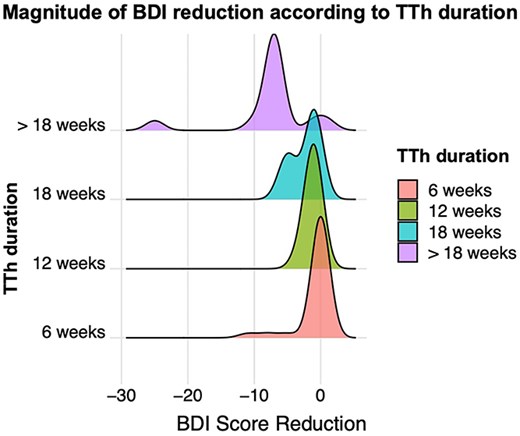-
PDF
- Split View
-
Views
-
Cite
Cite
C Corsini, E Pozzi, M Raffo, F Negri, A Bertini, F Belladelli, A Folcia, F Cattafi, M Malvestiti, R Matloob, L Boeri, A d'Arma, F Montorsi, A Salonia, TIMING OF MOOD IMPROVEMENT POST TESTOSTERONE THERAPY INITIATION, The Journal of Sexual Medicine, Volume 22, Issue Supplement_2, May 2025, qdaf077.078, https://doi.org/10.1093/jsxmed/qdaf077.078
Close - Share Icon Share
Abstract
Although testosterone therapy (TTh) is commonly prescribed for male hypogonadism, timing and extent of its effects on mood parameters and depression remain unclear. Despite we completely agree with evidence that TTh alone should not be used as a treatment option for men with clinical depressive disorders, we aimed to assess the impact of TTh in terms of mood deflection improvement, measured by Beck Depression Inventory score (BDI).
58 patients undergoing TTh were retrospectively analyzed. Baseline clinical characteristics, including total testosterone (tT) levels and comorbidities as scored with Charlson comorbidity index (CCI), were recorded. Patients were matched into two groups: those who showed improvement in their BDI post-TTh initiation, and those who did not report BDI improvements. Univariable (UVA) linear regression models explored the association between TTh duration and BDI changes. Ridge regression curves was used to graphically display the distribution in BDI reduction according to the duration of TTh (6 weeks, 12 weeks, 18 weeks and > 18 weeks).
29 (50%) reported variable improvement in BDI after starting TTh. Men who did vs. did not perceived mood improvement were not different in terms of age (median (IQR) 56 (50-63) vs. 61 years (53-67); p = 0.57). Groups had similar BMI (5.9 (24.6-28.1) vs. 26.8 kg/m2 (24.6-29.4); p = 0.34). Baseline BDI were 11 (7-18) in the improving group and 7 (3-12) in the non-improving group (p = 0.08). Borderline depression (BDI > 16) were present in 7 (24.14%) men and in 4 (13.79%) men, respectively. Most patients reporting BDI improvement received TTh for >18 weeks (14 patients, 48.28%), 3 (10.34%) were treated for 18 weeks, 9 (31.03%) for 12 weeks, and 3 (10.34%) for 6 weeks, respectively. All 29 patients (50%) who did not show BDI improvement were assessed at the 6-week mark. Linear regression analysis showed that the longer TTh duration the greater the BDI improvement (coefficient -0.002, p = 0.0001), after adjusting for age, BMI, and baseline tT levels.
Although still preliminary, our findings suggest that mood improvements following TTh initiation may occur progressively, with the most substantial reductions in depressive symptoms observed after 18 weeks post-TTh initiation.
None.




